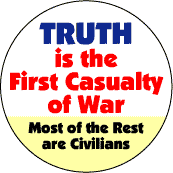
Originally Posted by
j2k4
If it were known the U.S. possessed a proprietary concoction that would induce any detainee to purge himself of every last detail of intelligence to which he was privy, and the unilateral use of this substance was so effective as to allow the total and indiscriminate extermination of all terrorists (with no collateral damage) by the U.S. in, say, two years, would you look upon this as a favorable development?
Some people cannot get it through their heads that killing terrorists creates martyrs and more terrorists... despite the Whitehouse/CIA's own figures backing up this fact both by number of terrorist attacks and estimated number of terrorists.
Go figure...
Re: The Geneva Convention.
Your wrong j2k4..
The signatories agree to treat everyone, whether they are a signatory or not, according to the convention.
The most notable was in WWII...
Japan was not a signatory, and did not treat their prisoners according to it.
The allies were, yet still treated Japanese POWs according to the convention.
As for current stuff:
attorneys
Prisoners of war must have the right to legal advice, particularly in the case of preparing powers of attorney and wills. ( Convention III, Art. 77)
The same applies to civilian internees. ( Convention IV, Art. 113 )
Military commanders must have access to legal advisers to instruct them on the application of the Geneva Conventions. ( Protocol I, Art. 82)
They have to be one or the other... yet no attorneys.
baths
Prisoners of war must have access to baths and showers, as well as sufficient soap and water for personal toilets and for laundry. Women prisoners must have separate facilities. ( Convention III, Art. 29)
The above also applies to internees. ( Convention IV, Art. 85 )
canteens
All prisoner of war camps must have canteens where prisoners can get food, soap, tobacco and other everyday items. Prices may not be higher than in the surrounding area. Any profits must be set aside for the benefit of the prisoners. (Convention III, Art. 28)
Similarly, internees must have access to canteens, unless equivalent facilities are already available. Profits must be set aside for the benefit of the internees. (Convention IV, Art. 87)
carpet bombing
Area bombardments and other indiscriminate attacks are forbidden. If it becomes apparent that an objective is not a military one, or if an attack is expected to cause incidental loss of civilian life, injury to civilians or damage to civilian objects then the attack must be canceled or suspended. (Protocol I, Art. 57, Sec. 2b)
An indiscriminate attack affecting the civilian population or civilian objects and resulting in excessive loss of life, injury to civilians or damage to civilian objects is a grave breach of the Geneva Conventions. (Protocol I, Art. 85, Sec. 3)
censorship
Letters written by prisoners may be censored but a detaining power cannot use the excuse of not having enough translators to limit the number of letters that prisoners are allowed, unless the protecting power agrees. (Convention III, Art. 71)
The censoring must take place as quickly as possible by the dispatching state and the receiving state, and only once by each. The examination of packages must take place in the presence of a prisoner or a prisoner’s chosen representative. Any prohibition of correspondence must be temporary and as short as possible. (Convention III, Art. 76)
Similar guidelines apply to internees’ mail. (Convention IV, Art. 112)
Letters written by captured chaplains may be censored. (Convention III, Art. 35)
chemical weapons
Prohibited under the 1925 Geneva Protocol
civil defense
An occupying power may not change the structure of these organizations in any way that interferes with their functioning, or compel its personnel to carry out other tasks. (Protocol I, Art. 63, Sec. 1 and Sec. 2)
civilian immunity
Civilians have special protections under Convention IV, Protocol I, and Protocol II.
They must be treated humanely, without discrimination based on race, color, religion or faith, sex, birth or wealth, or other similar criteria.
Violence to life and person including murder, mutilation, cruel treatment and torture are prohibited.
The taking of hostages is prohibited.
Outrages upon personal dignity, including humiliating and degrading treatment are prohibited.
Sentences and executions without a judgment from a regularly constituted court and without benefit of the standard judicial guarantees are prohibited. (Convention IV, Art. 3)
See civilian population, women, murder, rape, torture, discrimination, civilian property, places of worship, cultural objects, grave breaches, and indiscriminate bombing to start with.
civilian objects
Combatants must distinguish between civilian and military objects and attack only military targets. (Protocol I, Art. 48)
civilian
A civilian is any person who does not belong to any of the following categories: members of the armed forces, militias or volunteer corps, organized resistance movements, and residents of an occupied territory who spontaneously take up arms.
If there is any doubt whether a person is civilian, then he or she is to be considered a civilian. (Protocol I, Art. 50, Sec. 1)
Want me to go on??
The USA is currently breaking the Geneva Convention left, right and centre... you might as well withdraw from it to avoid confusion. There are political parties here already suggesting we leave it.
Originally Posted by JPaul







 Reply With Quote
Reply With Quote



Bookmarks